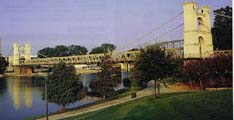
|

|
Waco's role in the Populist MovementCharles Reed |
|
The Populist Movement of the late nineteenth century was the greatest mass movement for democracy and economic justice in American history. A group of poor Central Texas farmers started the movement in Lampasas County. The Populist Movement was conceived in Lampasas, born in Cleburne, and learned to walk and talk in Waco. It was led by Charles W. Macune of Milam County and Waco. Macune became the leader of the Texas Farmers Alliance at the Cleburne conference in August 1886. During his life, he was at once a doctor, a lawyer, a journalist, an editor, a union organizer and a Methodist preacher. Due to a convention in Waco in January 1887, the Populist Movement spread across the South like a prairie fire, and then up through the Great Plains. During a four-day convention in Waco in April 1891, the Texas Farmers Alliance decided to join in creating a third political party — the People's Party (later known as the Populist Party). The Populist Movement initiated fundamental changes in our national government and economy. It also caused a realignment of our two major political parties. It caused the Democratic Party to become the party of farmers and laborers. Dr. Lawrence Goodwyn of Duke University (formerly of the University of Texas and the Texas Observer) wrote the definitive history of the Populist Movement, Democratic Promise. I was given the honor of introducing Dr. Goodwyn at the Texas Populist Convention in Austin in 1991. Prior to Dr. Goodwyn's book, the primer on the Populist Movement was The Populist Revolt by John. D. Hicks of the University of Nebraska. Dr. Goodwyn took issue with Hicks on some counts. Hicks, he charged, was more concerned with the shadow movement in the Midwest than with the true Populist Movement. |
The Populist Movement was the source of the following reforms that were later adopted: (1) the constitutional amendment for the direct election of United States senators by the people, (2) the constitutional amendment providing for a progressive income tax, and (3) use of the Australian secret ballot in elections. In 1896, the Populist Party merged with the Democratic Party under the leadership of the great charismatic figure, William Jennings Bryan of Nebraska. Bryan's famous "Cross of Gold" speech at the Democratic National Convention in Kansas City that year won him the party's nomination for president. Bryan was nominated three times, but was never elected. Nevertheless, beginning in 1896, the Democratic Party became the party of working people, and the Republican Party became the party of the corporate business elite. Relatively speaking, that's still true today. Bryan's "Cross of Gold" speech inspired a local teenager who watched it through an open window, Harry S Truman. A half century later, Truman would become America's only populist leaning president. The Populist Movement was essentially a rural movement by farmers. But in many respects, it was the forerunner to the urban-centered Progressive Movement two decades later. Presidents Theodore Roosevelt, Woodrow Wilson and Franklin Roosevelt were all considered progressives. Charles Reed is a retired civil servant and former mayor of Waco. |
|
Return to First Person home page |
|